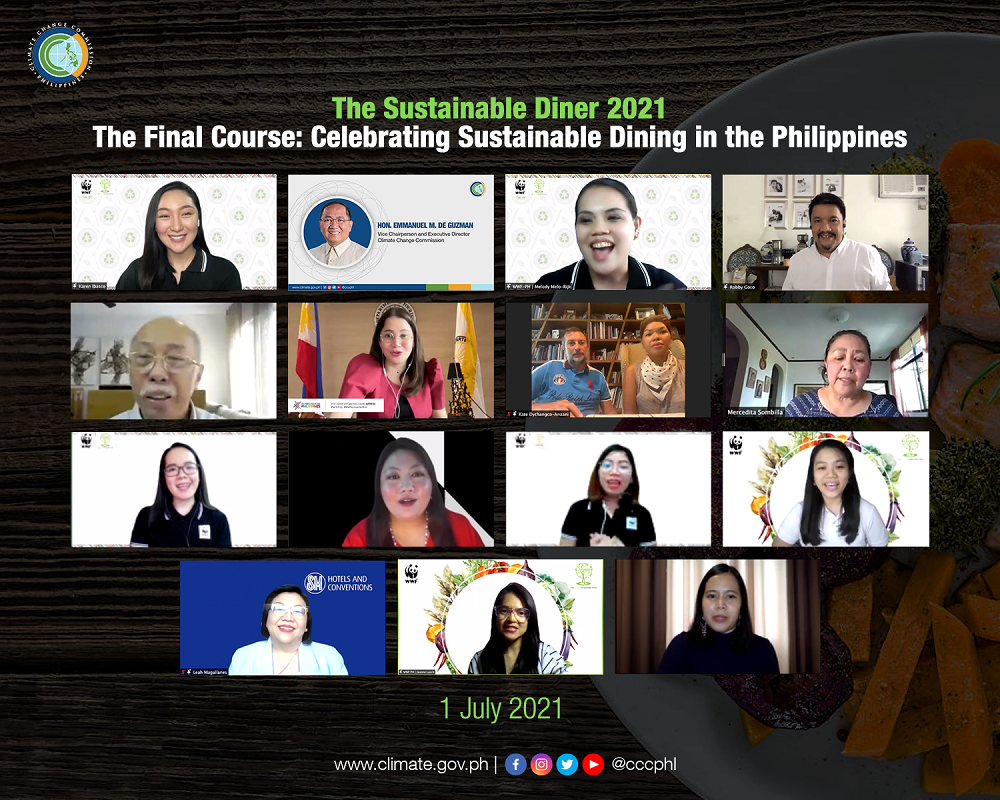
July 04, 2021 Sunday

MANILA, 5 July 2021 — The Climate Change Commission (CCC) throws support to the foodservice sector in transitioning into a low-carbon industry by advancing their capacities to adopt sustainable practices.
The Sustainable Summit 2021, organized by the World Wide Fund for Nature (WWF) Philippines, gathered stakeholders to exhibit accomplishments aligned to the country's food sustainability priorities and agenda, and to have a discourse on policy and best practices for sustainable dining.
With the theme, “Final Course: Celebrating Sustainable Dining in the Philippines,” the Summit supports the efforts of the Philippine government to establish sustainable consumption and production (SCP) strategies in the country.
In his opening remarks, CCC Vice Chairperson Emmanuel M. de Guzman highlighted the contribution of food production systems in the present climate crisis, particularly of the agriculture sector which accounts for around 30% of greenhouse gas emissions.
“To fix hunger, we must rethink both how we consume, and how we produce what we consume. A combination of significant dietary changes, huge reductions in food losses and waste, and significant improvements in food production methods are required to make this transformation,” said de Guzman.
Vice Chairperson de Guzman proposed the following measures to attain sustainability in the food service sector:
Ramping up public consciousness about more readily available, accessible, and affordable food, while also increasing awareness about the damage that harmful and unsustainable meals bring;
Increasing the diversity of nutrient-rich crops, rather than focusing on high volumes of a few crops;
Utilizing technology and system innovation to cultivate existing land to get higher yields, sequester carbon, and conserve biodiversity and ecosystem services; and
Reducing food loss and waste during the food manufacturing and consumption stages through technological solutions, consumer campaigns, and policies.
With food security as one of the thematic areas of the National Climate Change Action Plan, the CCC is committed to assist the food sector in transitioning into a low-carbon and sustainable industry by developing national and local policies to create an enabling environment for sustainable food value chains, and finding pathways to combine supply-side actions such as efficient production, transport, and processing with demand-side interventions such as modification of food choices, and reduction of food loss and waste.
This transformation is parallel with the country’s commitments under the first Nationally Determined Contributions (NDC) crafted and implemented through the convergence among national government agencies including the Department of Finance, National Economic and Development Authority, Department of Agriculture, Department of Environment and Natural Resources, Department of Transportation, and Department of Energy, along with the academe and civil society. The DOF and CCC led the efforts to complete the technical process of the NDC.
“The CCC is serious about food sustainability. This entails seeing it not as a series of sectors and industries, and even the consuming public, battling it out for prevalence over the agenda, but as an intricate tapestry of stakeholders bound by a common vision: A healthier society, one where stomachs are filled, where farmlands brim with yield, where foresight and compassion reign, not only today, but for the generations to come,” de Guzman assured.
The Sustainable Diner Summit 2021 is held under the Sustainable Diner: A Key Ingredient for Sustainable Tourism Project. The Project produced studies and resources, such as a food waste management case study, a feasibility study on a food donation programme, a cost-benefit analysis on sustainable business approaches, a food service life-cycle assessment, eco-labeling criteria for the foodservice sector, and environmental teaching manuals for primary and secondary school teachers.
They are also working with the food service sector such as restaurants and hotels to offer sustainable dining options and improving their sustainability performance through local and sustainable food sourcing, food waste reduction, water and energy efficiency, avoidance of single-use plastics, plant-based dining options.
To know more about the highlights of the event, visit the Facebook Page of the WWF Philippines at https://www.facebook.com/